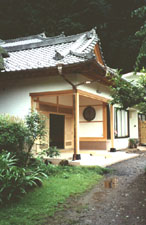"True Victory Is Victory
Over The Self"
What is Jiyushin?
What is Jiyushin? How does it relate to our study of Budo? Does it fit in with whatever religion a student believes in? Do I have to agree with the philosophy of jiyushin to practice aikido or other arts within Jiyushinkai? How is the basic philosophy of Jiyushinkai different from the Ueshiba-ha ryu practice of aikido today? Good questions, right? I hear these and many similar questions in my talks with students from Jiyushinkai and from other groups. I will try to answer these questions with my view (right now) of what jiyushin is.
Jiyushin is written with a combination
of three ideograms:
![]() The first kanji, ji,
means oneself.
The first kanji, ji,
means oneself.
![]() The second kanji,
yu, is a reason or meaning. Jiyu means freedom.
The second kanji,
yu, is a reason or meaning. Jiyu means freedom.
![]() The third kanji,
shin, is a combination of what we think of as our spirit,
our emotional mind, and our heartfelt feelings and deep seated
motives.
The third kanji,
shin, is a combination of what we think of as our spirit,
our emotional mind, and our heartfelt feelings and deep seated
motives.
Added together, we have an idea of freedom of heart/spirit/basic motives/self-reliance. It is often impossible to pin down a Chinese or Japanese kanji in exactly equivalent English words.
A specific use of the term jiyu occurs within Zen Buddhism. In the original Chinese Ch'an or Zen the idea of freedom was crucial to the ultimate experience of self-realization or enlightenment. "Zen is purely devoted to liberating the hidden potential of the human mind... The freedom that Zen proposes is not remote, but right in this world. It does not require anything extraneous, but can be put into practice in the midst of normal occupations and activities. It is applicable immediately, and develops naturally... According to Zen teaching, freedom that depends on things of the world can be undermined, and freedom that can be granted can be taken away." (Thomas Cleary, Zen Essence - The Science of Freedom (Shambhala Publications, 1989) intro.) This freedom and the authority that both come with it and from it are within us all. We can realize this freedom at any time. "Enlightened Zen freedom, being in the world yet not of the world... is not a negative detachment but a balance of independence and openness...The paradox of Zen freedom is that it is present and available, yet somehow elusive when deliberately sought." (Cleary, intro.) For a basic understanding of jiyu, form a word construct containing: free thinking / self-reliant / responsible / vulnerable / aware / self-confident. Of course this sounds like something we all want! However, the more we want "it" and look for "it", the more "it" eludes us.
Zen Master Linji, as translated by Thomas Cleary, says "What I point out to you is only that you shouldn't allow yourselves to be confused by others. Act when you need to, without further hesitation or doubt. People today can't do this... what is the affliction? Their affliction is their lack of self-confidence. If you do not spontaneously trust yourself sufficiently, you will be in a frantic state, pursuing all sorts of objects, unable to be independent." (Cleary, p.4) (This original statement is from the ninth century!)
The question is, how do we achieve this self-confidence or jiyushin? We must first discover our TRUE INTENT, our original self full of pure intention. Try to remember what the intent of a new baby feels like. Uncover, and bring forth the freshness and originality of this intent. Now, how do we change our daily habits and aquire the ability to express and actualize this intent each instant? We must practice some sort of disciplined awareness with this intent.